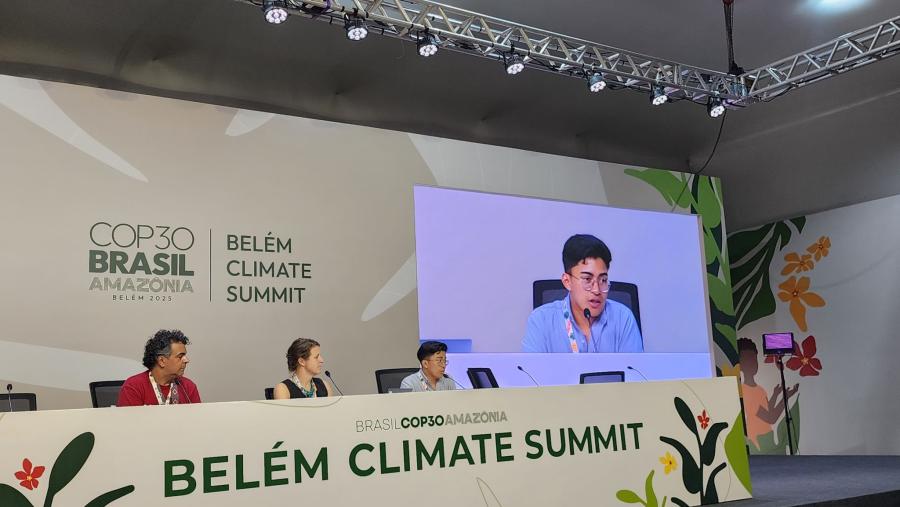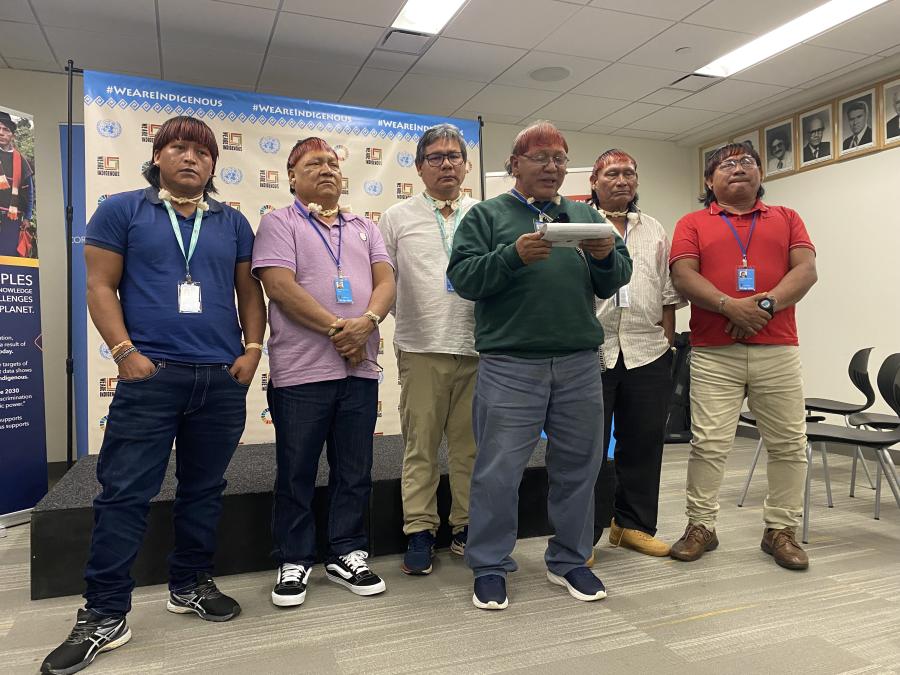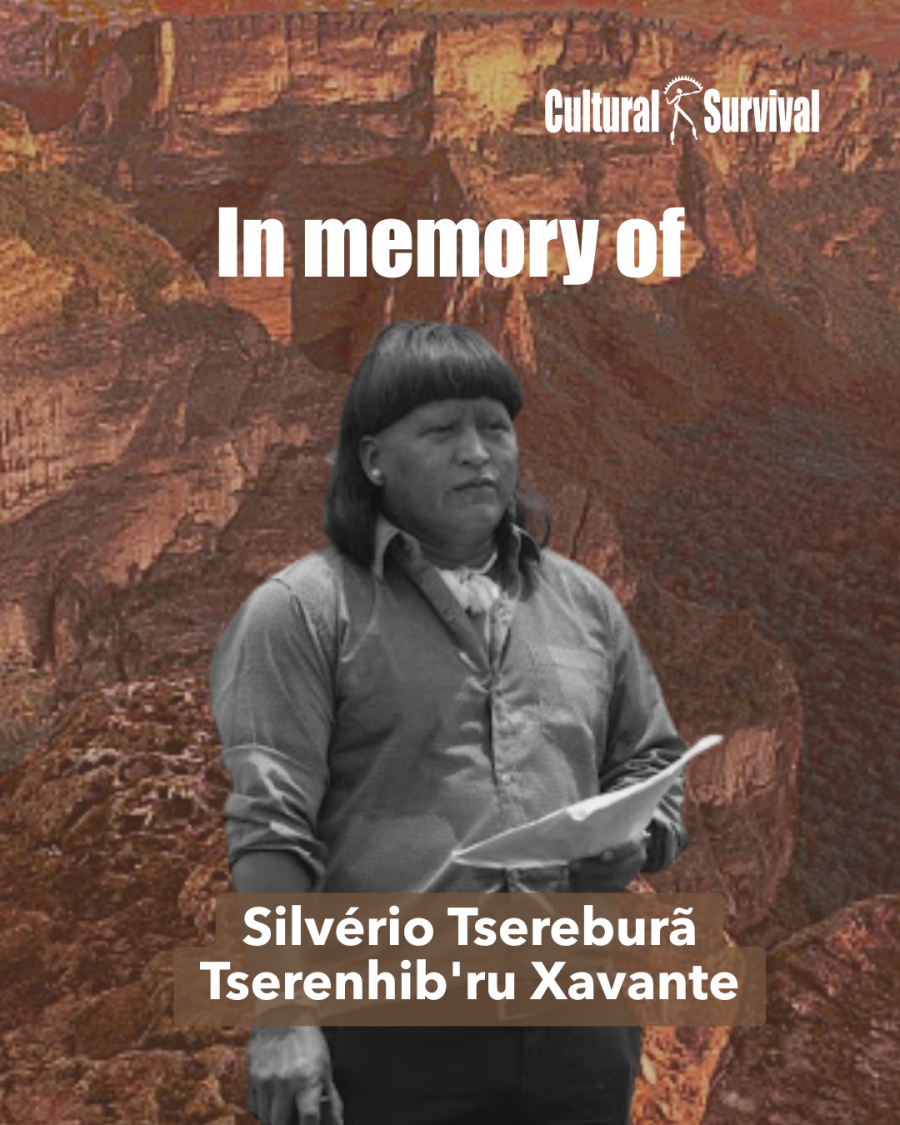
By Edson Krenak (Krenak, CS Staff)
Content Note: The following includes disturbing information on violence against Indigenous Peoples
Being Indigenous is dangerous. Regardless of the roles the Indigenous community may play in society—decolonizing the State by transforming unjust laws into just policies, defending the environment, protecting biodiversity, or advocating for self-determination, human, and nature rights—all of these roles have brought violence, harassment, and death to thousands of Indigenous activists and leaders in Brazil.
We all witnessed (yes, we are all witnesses) and are deeply troubled by another terrible episode in the history of territorial justice and Indigenous Peoples in Brazil, which occurred on January 21, 2024. Three Indigenous leaders from the Pataxó Hã Hã Hãe Peoples, Cultural Survival’s Keepers of the Earth Fund (KOEF) grant partners, were shot during an attack by a group of farmers. With the presence of the military police of the state of Bahia and with the negligence, and sometimes even with the consent and support of authorities, this group of farmers, self-identified as "Invasão Zero," attempted to reclaim the Caramuru territory, the traditional land of the Pataxó Peoples, in the municipality of Potiraguá, located in the extreme south of Bahia.
Photos circulated in news outlets and on social media showed the shocking image of police protecting farmers as they surrounded the Indigenous community and opened fire on them. One of the wounded was Chief Nailton Pataxó Hã Hã Hãe, whom Cultural Survival visited in 2022. Chief Nailton holds a doctorate in Notorious Wisdom in Traditional Knowledge from the prestigious Federal University of Minas Gerais in Brazil. His sister, Nega Pataxó, a highly respected shaman and spiritual leader, was killed. The third victim was Chief Nailton's stepson, William, who was grazed by a bullet and is recovering. In addition to the leaders who were attacked, many other members of the community suffered serious injuries, including another leader, Chief Aritana, who was shot in the abdomen. As of the time this text was written, seven others were still in the hospital receiving treatment. In a recent interview after the incident, Chief Nailton confirmed that the Military Police of the state of Bahia actively participated in the attack on the community.
Nega Pataxó was a great political and spiritual leader of her people. She was concerned with healing the land and sustaining and strengthening life. Her spiritual leadership mobilized youth and Indigenous women in a continual struggle for the environment. Her strong presence and relevance extended beyond the Catarina Caramuru Paraguassu territory to other fronts, such as the Terra Livre Camp and academic institutions throughout the country. There are many videos and images on the internet of her singing and teaching while planting trees.
Chief Nailton has been an exemplary force in decolonization and the struggle for self-determination of Indigenous Peoples in Brazil for decades. He organized workshops in his community to decolonize the land called "Retomadas" (Taking back), and his perseverance in activism and the defense of Indigenous rights in various parts of the country is evidenced by the successful reclamation of over 50,000 hectares (around 200 square miles) of the Caramuru-Catarina Paraguaçu Indigenous land, along with other communities that were neglected by the State.
Even in the context of the 1987/1988 Constituent Assembly defending human rights and the forest peoples, Chief Nailton served as an advocate for the most significant landmark of Indigenous rights in Brazil, the 1988 Constitution (which, in its implementation, has completely failed). Chief Nailton’s negotiations and forms of strategic, spiritual, and astute political communication are guided by a spirit of safeguarding life, social justice, environmental protection, and the need to pass on his knowledge and experiences to young leaders.
According to a statement from the Articulation of Indigenous Peoples of Brazil (APIB), "Ruralists from the region surrounded the area with dozens of trucks while the police shot at the Indigenous people. They mobilized through a WhatsApp call, summoning farmers and traders to carry out the repossession of the farm with their own hands. Two farmers were arrested for illegal possession of weapons. A video shows the injured individuals on the ground, still without assistance, being surrounded by the group of ruralists who celebrated the violence."
The illegal repossessions of land are cruel, unethical, and harmful actions that undermine the inherent rights of Indigenous Peoples. This situation, exacerbated by the negligence of the Brazilian State, has compelled Indigenous communities to conduct self-directed measures like self-demarcations and surveillance for their own protection. For many years, the Pataxó Hã Hã Hãe Peoples have endured persistent prejudice and discrimination from parts of Brazilian society, particularly local authorities and farmers. These groups often label Pataxo Hã Hã Hãe as "fake Indians," blatantly denying their right to self-identification and the preservation of their traditional identity and ignoring the historical violence that drove them away from their lands.
Behind the new wave of attacks is the legal thesis of the Marco Temporal (temporal framework). Even though it was rejected by the country's Supreme Court at the end of 2022, the interpretations generated many bills and projects, renamed, and spread across various other laws that ended up being approved by the Brazilian Congress despite being declared unconstitutional by the Federal Supreme Court and human rights organizations.
The Marco Temporal and the policies that are created from it allow non-Indigenous individuals and groups to claim Indigenous lands if the Indigenous people are unable to prove their occupancy prior to 1988. In Brazil, it is impossible for Indigenous communities to present papers as there was no land titling to Indigenous people before the 19th century. Moreover, since the establishment of numerous land policies, a violent regime of latifundia (a large estate worked by enslaved people) expansion by the country's economic elite since independence in 1822, the State's machinery has been used to remove and expel Indigenous communities from their lands and extinguish their cultures. The 20th century was marked by forced integration policies, assimilation, and forced removals.
In a letter addressed to the Minister of Justice, Indigenous Congresswoman Celia Xacriaba drew attention to these alarming findings and called for immediate action to protect Indigenous peoples in the region. The letter emphasizes the impunity that has prevailed in these cases in the region, as the perpetrators have often acted with the tacit support of law enforcement officials in the context of big enterprises.
A recent report by the Indigenous Missionary Council (CIMI) has documented a disturbing pattern of violence against Indigenous Peoples in the state of Bahia. The report highlights the involvement of a group of ranchers and their associates who have been using social media and other communication platforms to organize coordinated attacks against Indigenous communities and documents a range of abuses, including physical attacks, threats, invasions of Indigenous lands, and the destruction of property. Indigenous leaders have been particularly targeted, with some being subjected to intimidation and violence. The report also notes that the attacks have had a devastating impact on Indigenous communities, causing fear, displacement, and disruption of their traditional way of life. “In Bahia, the leaders of the Pataxó people have become targets of ranchers and their gunmen. Persecution, threats, beatings, invasion, and murder have become routine in the daily lives of Indigenous families. There, violence has also taken on dramatic proportions, with the difference that military police officers, who, according to investigations, act in a kind of rural militia at the service of ranchers, do so outside of work hours.”
Xacriaba’s letter urges the government to take decisive action to address this crisis. She calls for the investigation and prosecution of the perpetrators of these crimes, as well as the implementation of measures to protect Indigenous Peoples from further violence. The letter also emphasizes the need for a comprehensive strategy to address the root causes of the conflict, including land rights and socioeconomic inequality.
The violence against Indigenous Peoples in Bahia is a serious violation of human rights and a threat to the integrity of the Brazilian legal system. The government must take all necessary steps to protect the lives and livelihoods of Indigenous Peoples and ensure that justice is served. Once again, our relatives are victims of violent laws, a weak and incapable State, and criminal sectors of civil society. We demand that the local authorities, along with the Ministry of Justice and the Federal Public Ministry, investigate the case and punish the criminals. And we demand the Brazilian government demarcate lands for the Pataxó Hã Hã Hãe Peoples in Bahia.
Cultural Survival expresses our solidarity with the Pataxó Hã Hã Hãe Peoples and the family of Chief Nailton, and honors the exemplary history and memory of Nega Muniz Pataxó.
Top photos: Nega Pataxo - photo Teia dos Saberes, 2022 Cacique Naiton. Chief Nailton, Photo by Portal Desacato.



